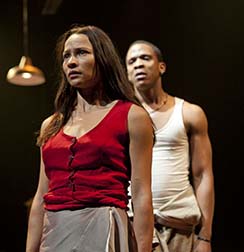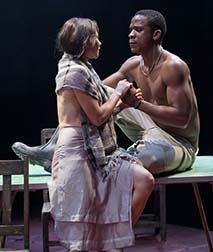By Lucy Komisar
When I saw the promotion photos of a man lying on a woman with his hand on her bare breast, I thought this play would be erotic. It is anything but. It is searing, but it is the heat of violence not of sex. There is a lot of blood. The blood of a violent coupling. The blood of puppies that the white farm owner wanted killed because his dog mated with a local black dog, not one of the pedigreed ones. Funny that it seems exploitative and humiliating of both the man and the woman while not being erotic.

I had seen the original August Strindberg‘s “Miss Julie” written in 1888, about the daughter of a Swedish nobleman who has an erotic encounter with her father‘s footman on the evening of a midsummer‘s night party.
Then in London I saw Patrick Marber‘s version set in July 1945 at the English country house of a Labor Party supporter after Labor‘s landslide victory.
Both of those plays were about class. But South African playwright Yael Farber‘s work, which takes place in the present at the 18th anniversary of the election of Nelson Mandela in 1994, mixes class and race, which raises the ante. It is very powerful and very depressing. Farber also directed.
Julie (Hilda Cronje) is the white daughter of the landowner, and John (Bongile Mantsai) is a black servant whose tasks including symbolically polishing the owner‘s boots. The play takes place in the kitchen of the estate in the semi-desert Karoo of the Eastern Cape.

John is morose, well they are all morose. Nobody ever smiles in this play. John at least shows some realism about his position, which hasn‘t changed much since apartheid ended. But when Julie throws herself at him, his childhood attachment and the fact he‘s a man rouse a complex sexual response. Mantsai pulsates with raw energy, sometimes bounding around the stage.
Cronje as Julie is the opposite, listless, but curiously seductive, as if her physical weakness is a burlesque that plays on the stage of her power.
What answer does Farber want us to come away with? That the relations between blacks and whites in South Africa are doomed? Strindberg‘s story more clearly pointed to the enduring underlying message. It’s about the dominance of class derived from skewed economic power.
“Mies Julie.” Written & directed by Yael Farber. Baxter Theatre Centre at St. Ann‘s Warehouse, 29 Jay Street, Brooklyn, NY. Opened Nov 12, 2012; closes Dec 16, 2012. 12/3/12.

